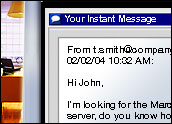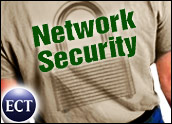
The hosting industry has come a long way since Affinity Internet entered the market in 1996. Hundreds of dot-com companies have disappeared or been reinvented. Clients are more sophisticated, with even the smallest operation demanding better products and more personalized service.
Fort Lauderdale, Florida-based Affinity focuses exclusively on the vast — and relatively untapped — small and midsize business market. CEO Peter Chambers said the company has more than 300,000 clients, with ambitious plans to grow even more in the months and years ahead. To meet the diverse requirements of the small and midsize business arena, Affinity offers multiple brands such as ValueWeb, Bigstep, HostSave and WinSave.
Affinity — which has data centers in Fort Lauderdale and El Segundo, California, as well as a research and development office in San Francisco — also offers multiple hosting options ranging from basic Web sites and e-commerce sites to dedicated servers and custom-engineered systems.
Recently, Affinity unveiled its first premium services bundle for ValueWeb clients. The suite includes wizard-based tools and services for Web site creation; tools that let clients enhance their sites; site maintenance, management and support; search engine optimization support tools and assistance, and back-office e-commerce capabilities. The company also plans to further address the specific needs of key vertical markets, such as real estate and restaurants, Chambers told the E-Commerce Times in a recent interview, which follows.
E-Commerce Times: How would you describe Affinity and what you do?
Peter Chambers: Affinity is a premium provider of services and we’re a premium provider of Web services. The reason why I position it that way is that customers — our customers are small to medium-size businesses, anyone from a single operator up to, say, about 30 employees — are looking for service providers like ourselves to not only provide them access onto the Internet but to enable them to actually be successful on the Internet. And there’s a difference.
I equate it back to 30 years ago, you had telephone companies and they provided dial-tone, pretty much. All of a sudden, they figured out the Internet’s a great communications channel and a great way for people to be able to actually utilize that medium to grow their business, so you see them transition themselves from being a telephone company to being a communications company. People are looking for solutions to be successful. And we’re the same.
Fourteen months ago, when I started at the company, people described Affinity as a hosting company. I do not see Affinity today as a hosting company because, again, a hosting company pretty much provides a Web site and hosts that site. That’s pretty limiting in my view, and the customers want more than that. We’ve transitioned to a Web services provider — we not only provide the dial tone, being the Web site, but we now provide a full range of value-added services to meet that customer’s needs.
What Affinity is also addressing is a sector of the market that’s been terribly neglected over the years. I think small to medium-size businesses are very taken for granted, to be frank with you. We are addressing that straight up.
ECT: It does seem ironic, because there are so many small and midsize businesses out there without large IT departments. Why do you think it has been neglected?
Chambers: I think they’ve just been taken for granted. Here’s an example for you. Look at all the search engines out there today. If you go to a search engine and do a general search, all the big guys come up first, and you can understand that. They’re the guys that have the resources and the money. As you go forward, you are going to see greater emphasis placed on the small and medium-size businesses in relation to the advice they get, to be successful that way. And that’s, for example, a service that we are rolling out ourselves in order to help our customers maximize their presence through search.
Here’s another example. When I arrived at Affinity, people said, “We service SMEs — small- to medium-size enterprises.” And I said, “Well, tell me what a small- to medium-size enterprise is.” And they were basically describing a small- to medium-size business, just exchanging the word enterprise with the word business. And there’s a difference. To me, a small- to medium-size enterprise is someone who has over 100 employees and is generating millions of dollars in revenue. If you look at the demands of a small- to medium-size enterprise compared to a small- to medium-size business, it’s profound.
I think it’s been a very misunderstood part of the market.
ECT: Are you focusing on specific verticals within small and midsize business?
Chambers: We went down a plan of positioning ourselves as a premium provider and also moving towards being a services provider. Now we are starting to address more verticals, such as restaurant owners, such as people in the travel industry, such as people in real estate. To be frank, another area of the market we’re starting to look at is the woman entrepreneur. I personally think that’s a huge market.
ECT: Pick one of the verticals you’re focusing on: What are some of the different services you provide?
Chambers: Let’s take real estate. First of all, the way they set up their Web site and the options that they have, they should have certain Web templates they can utilize that are more specific to their market. Two is, they clearly want to be able to drive business to their site and have exposure on the Web, so things we’ll look at are advice in the area of the key words that they utilize to do that — and it’s going to be specific to their industry. Another thing is the type of e-mail that they provide, providing a more reliable type of e-mail, since a lot of documentation goes across, so it’s got to be a far more robust e-mail system.
Also, in relation to some of the back-office systems that we’re looking at — we’re not promoting it, but we’re looking at it — is providing increased scheduling capabilities and so forth, because they’re on the road a lot, and they have to schedule meetings and all that kind of stuff.
We work under the premise of a seven-pronged value proposition, and that includes Web creation and management, security, communication, traffic maximization, e-commerce and marketing, business solutions and lifestyle. We will select various elements in each one of those elements of the proposition directed to a vertical. We’re in transition on that. If you look at us now, we’re not perfect in all those areas but we’re certainly identifying the need for all that.
ECT: So do you work with experts in each field?
Chambers: I take customer calls and complaints every day. I think it’s important that CEOs do that. That does two things: It gives me contact into the customer base; it also enables me to understand what they’re saying, what their issues are. For example, pretty regularly I speak to a Realtor in Arizona and I sometimes use him as a sounding board about some of the things we’re doing.
Another area of the market is resellers — resellers of our services, like Web design small businesses. I spoke to one yesterday: “What do you need in relation to an offering from us?” Nothing beats going and speaking to these guys and understanding what they want.
ECT: Is it easier for an small and midsize business to buy a bundle from one provider or reseller than purchase individual pieces?
Chambers: We just released our suite of premium services. We think bundles are an excellent approach in terms of key services that should be available, then be able to provide the customer with add-on services that they can utilize specific to their business, such as increased traffic-maximization tools, online advertising advice, also back-office solutions for integration of accounting and e-commerce capabilities, for example, and providing them with direct access into Google and that kind of stuff. So, what you have seen as a company over the past 12 months is very much that implementation of improving from the bundle to add-on services.
ECT: The best of both worlds, I guess?
Chambers: You’ve got to. I think one of the key differences between small- to medium-size business and an enterprise is small- to medium-size businesses really — and I think it’s great — see themselves as an IBM. They’re very proud of their business. However, they’ve got more specific ideas as to what they want, so to an extent you have to touch the customer more being a small- to medium-size business than an enterprise business.
ECT: How does that then stretch your resources? Isn’t this one of the reasons some companies have steered clear of small and midsize business?
Chambers: It’s a challenge. The challenge in dealing with the market is you also have to be fiscally responsible in running your business. One of the big issues I see in the industry at the present time is you see a lot of competition in the marketplace just reducing their prices. The only person who suffers at the end of the day from a really cheap price is the customer, because economically you have to make it work. Two things are going to happen. Either you’re going to get to an economic point where the price can’t sustain the business, so you’re going to go out of business, so the customer loses there. Or, secondly, you reduce the price to such a point you’ve got to cut services, so the customer loses there. Thirdly, you reduce the amount of money you can reinvest back into your product line: The customer loses there.
One of the challenges is not so much educating the customer but holding your ground in relation to a price to be able to sustain the service. We, for example, run our own customer call center and our own customer service center in the U.S. in Fort Lauderdale. We do not plan on outsourcing it. We do not plan on sending it overseas because we believe — and customers are telling us this — it’s an important point. From a premium point, this is something we have to do. What they’re also looking for is a far greater integration of tools. They’re not interested, as such, in getting free software, because a lot of times they’re not educated in all that. That puts pressure on us from a resource standpoint and a price standpoint, so our approach is to create value and charge for it. We are not the cheapest in the game, but we do believe, for the price we charge, we add value.
ECT: Going back to the phone analogy, there has to be a discomfort level with a company that’s charging something ridiculously low like 2 cents a minute for long distance?
Chambers: Well, here’s an example for you. We just put our prices up. We actually increased the price for our existing customer base as well as our new customer base. We got feedback from customers saying, “Thanks for the service. We’re happy to pay the additional price.”
ECT: Did you lose any business?
Chambers: We have received e-mails from 30 customers. We have today 300,000 customers, and 170,000 of those are our direct customers. Our approach is: provide great service, provide a premium service and look after our true customers. That’s what you have to do.
ECT: When you speak to prospective clients, are these some of the things you recommend they keep in mind?
Chambers: If someone’s going to buy services, they have to look at a number of things. First of all, they’ve got to make a decision as to are they serious about their business or are they not? If they’re serious about their business, they need to look at the support that a provider provides them, and that’s customer service. They need to look at the bundles and the add-on features, because you set a business up not only to exist but to grow, and you expect your service provider to be able to grow with you. To me, that is very, very important. Three, you need to look at the company itself and make sure it’s been around for a while and, in fact, is going to be around going forward. The last thing you want is your business to be going well and then, all of a sudden, the key provider you’re working with to have an online presence has just gone out of business.
Finally, they need to look at certain features: What is the provider doing around security? What is the provider doing around spam? What is the provider doing around uptime? Again, reliability of service and what I would classify as being a good corporate citizen from the standpoint of taking its responsibility seriously.
ECT: So is word-of-mouth the best way for you to gain business?
Chambers: We get customers a number of ways: word-of-mouth, through partners and through online. It’s amazing how many customers come through word-of-mouth.
ECT: Is security the biggest issue these days?
Chambers: It’s huge, a huge issue. We’ve just recently introduced a premium spam service. Our approach was, “Let’s go and get the best in the marketplace. Let’s not home-grow this thing. Let’s go with an expert.” We went with Brightmail. Brightmail’s a fantastic partner. They run a great service, and we’re knocking out a huge amount of e-mail. Antivirus protection is such a critical issue now, and we take that very seriously.
Denial of service attacks that providers of service are suffering from [caused us to] take the approach where we have put software in place and so forth to protect ourselves from those.
The Internet is an open network, unlike a phone system which is a closed network, so there’s a huge responsibility there. We’ve also set up internally a security department to actually handle this and to also look at our own users. We need to make sure that we have customers today that are abiding with the rules and regulations of the industry. So we also look at what our own customers are doing to make sure [of that] because we have that responsibility.
I get quite animated on security. Being an appropriate corporate citizen, such as ourselves, you need to focus on security.
ECT: You mentioned Symantec’s Brightmail. Who are some of your other partners?
Chambers: We work with NetApps, which is obviously a significant provider of storage equipment and so forth. They’re critical for us. We work, obviously, with Cisco in relation to our routers and so forth. We also work with Network Solutions from the standpoint of domain names, and they’re a key partner of ours. We also work with Macromedia from the standpoint of software solutions. They’re a major partner of ours. We also work with AOL; we provide the Web services in this area to AOL. So we’ve got some nice, very, very supportive partners.
ECT: And do the marquis names help?
Chambers: Absolutely. This all comes back to credibility. I’m heavily into credibility and, therefore, to be able to work with those people successfully goes to credibility.
ECT: What would you say is the biggest challenge, either from a technology or market standpoint, looking ahead?
Chambers: On the marketplace, a huge challenge is to continually understand the customer. You must understand the customer. We are a customer-driven company so understanding that customer is a continuing challenge. I see that in a positive frame, not a negative frame.
Two is the whole issue of price and value, perceptions in the marketplace, companies just reducing prices without adding value. Us going the other way, we clearly challenge that approach.
On the technology side, the challenge is what’s going on in the Internet with the whole security issue. One of our themes inside the company is address an issue, don’t put it off. My approach is, “Look, there are security issues out there so let’s go and address them,” and that’s clearly what we’re doing.
ECT: How do you plan on continuing to grow Affinity in terms of organic versus acquisition?
Chambers: Look, we see ourselves as an extremely serious player in the marketplace. As you can imagine, we have both organic and incremental M&A strategy. I’m going to give you the corporate line here: We’re looking at both. We also think that’s very good from a customer standpoint because it gives us a greater range of opportunities to expand our services.
In the next six months we have areas we’re moving into from a service standpoint that are clearly consistent with being a Web services provider, especially down the online advertising front and that type of stuff. And working closely with our critical partners.
ECT: So what prepared you for Affinity?
Chambers: I worked with Coopers & Lybrand, and I led the consulting practice for Coopers in Southeast Asia for telecommunications. I had a wonderful opportunity to deal with telecommunication and communication companies of various sizes and got a great insight into those companies. Then, one of the critical things I did was take a position with a startup wireless company — GSM in Asia. That gave me wonderful exposure to the service side and the customer side and what it takes to run a business, a technology business. As a CEO, you need to understand both the customer side and the service and provisioning side.
Then I — and if you think I’ve been very planned on this, you’re right — took a position as CFO of a NASDAQ-listed company in the U.S. called LHS Communications, which is a customer-care and billing company, because I wanted insight into the U.S. and what it took to run a company of that size.
With Coopers, and understanding businesses from that side, with working with the wireless company and understanding that, then coming to the U.S. and working with LHS and understanding the corporate U.S. [market] and what was needed there were a fantastic three areas.
ECT: And you’re originally from Australia?
Chambers: Yes.
ECT: So you have some wanderlust there as well?
Chambers: With respect to every other country in the world, I think [Australia’s] the best country in the world. It’s such a fantastic place.
ECT: Do you see yourself ever going back?
Chambers: Oh, sure. I’ve got family there and so forth. But I also think the U.S. is a wonderful place to do business. There’s a can-do attitude in the States. I love that can-do attitude. I also love the challenges from a customer standpoint, demanding customers. I think if you can do it in the States you can do it anywhere.
You look at corporate America and the success stories and you’ve got to admire some of those.
ECT: Even though you spent a lot of time mapping out your career and gaining insight into various areas of expertise, did anything surprise you when you took the helm of Affinity?
Chambers: From an industry standpoint what surprised me the most was the understanding and the responsibilities of the industry. Having grown up in the dot.com era, there was a wonderful amount of energy around wanting to create a business. But you need to create a business understanding the responsibilities of that business to the customer. You are charging for services, therefore you have to understand what that means.
From an industry standpoint, and I think this goes across the industry, one of the things that surprised me the most was that approach, and, therefore, one of the greatest challenges.
ECT: What would you say your management strengths are?
Chambers: I’m very customer-focused. I’m very on the side of the customer. Two is I am very goal-oriented from the point of, “Hey guys. Set a vision. Set a strategy, and let’s just go and do it. Let’s not just talk about it.” Three is I love having very good people around me, and you need that. As a result of all of that, I’m heavily into credibility and respect. You need to have a management team that has credibility and also has respect.
The other thing is I do have a vision and I do have a plan on where I want to go, and you obviously need that. I have a grand vision for this company, and I think that’s very important.
Over the past three weeks I’ve been doing presentations to management and staff on where we said we were going to be 12 months ago, where we are today and what the vision is going forward. It’s very important that you’re continually able to communicate where a company is going and to be able to say, “Hey, this is what we said we were going to do and this is what we’re doing, and this is also where we’re heading.”
ECT: Can you disclose any of that vision?
Chambers: I’d prefer not to. Look, it’s obvious where we’ve come from, where we are today and where we’re going from a premium service provider. It’s clear to me that expansion of services that enable customers will be very successful.
ECT: How does being in Fort Lauderdale impact your hiring?
Chambers: I think it’s always a challenge to attract great people. It is a challenge to get the right people in the right place. The challenge also around that is, when you do have the good people, for them to be interested in you. This goes back again to credibility. One of the challenges, therefore, is to have Affinity known as a great company that people want to come and work for.






















































Social Media
See all Social Media